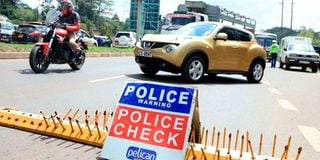Illegal car plates expose ministry’s laxity

A roadblock mounted by traffic police officers in conjunction with the National Transport and Safety Authority along Langata Road, Nairobi on April 13, 2021.
What you need to know:
- NTSA has been impounding hundreds of vehicles with customised number plates.
- Owners of high-end vehicles as well as senior government officials are the most common culprits.
An ongoing crackdown on cars with illegal number plates has once again exposed the loopholes created by the lack of a centralised system of vehicle registration plates in the country.
Hundreds of vehicles have been impounded mainly in Nairobi, raising questions as to who authorised issuance of the customised plates that have been on Kenyan roads for more than a year.
Owners of high-end vehicles as well as senior government officials, including those riding in GK-plated cars, are the most common culprits on the highways.
Production of number plates and registration of vehicles is controlled by Ministry of Interior through the National Transport and Safety Authority (NTSA) after the function was taken away from the Kenya Revenue Authority due to security concerns.
NTSA has in the past two days been impounding vehicles with customised number plates across the country for violation of the Traffic Registration of Plates Rules.
NTSA Deputy Director in charge of training, Mr Wilson Tuigong, yesterday said the crackdown, which started on Monday, will continue for the next two weeks.
Security features
"On Monday alone we impounded 83 vehicles across the city that had flouted traffic rules in six Nairobi sub-counties and the exercise will continue for the next two weeks,” said Mr Tuigong.
The National Disaster Management Unit Director Duncan Ochieng said a similar operation last year showed that the number of illegal plates in Nairobi was much higher than in other regions.
The Interior Ministry has for the past five years held back a plan to introduce proposed security features in new-generation number plates whose rollout has been held back by court fights as contractors seek to control the lucrative tenders.
The idea of having computerised number plates was to enable embedding of anti-counterfeit features, including holograms, watermarks, and laser markers that were to make it easier for police to trace information on vehicles and their owners.
Delay of the new-look plates has seen gullible vehicle owners fork out in excess of Sh30,000 for plates that resemble the proposed digital identifiers.
The government has, however, failed to arrest owners of garages that have been generating the illegal plates, raising queries as to who has been protecting the profiteers.
These number plates are even affixed on foreign mission-owned vehicles, pointing to a deep rot in the system.
New-generation plates
The Ministry of Interior and NTSA are also yet to confirm whether requisite tax is paid on the illegal plates. Some vehicle owners who get the illegal plates also keep their original identifiers, which they flush out when stopped by the police.
Mr Tuigong said some genuine, new-generation plates exist as NTSA had rolled out a pilot project.
“There was a pilot that was done by NTSA to change the design of the number plates. A few number plates were introduced up to KCT registration and back. So, the ones that we see after KCT are un-prescribed and there are certain features for those number plates so we can check and know,” he said yesterday.
The unregulated production and usage of motor-vehicle number plates is not only a major security threat but also a cause of double or even multiple insurance claims for vehicles that cause massive revenues losses for underwriters and the government through tax evasion.
Criminals have for a long time taken advantage of the illegal production of plates to create fake identifications for cars that they use to commit crimes.
One of the cars that was used in the Dusit D2 terror attack in 2019 had a fake plate that was similar to another vehicle of an identical model, which was traced to Ongata Rongai in Kajiado.






